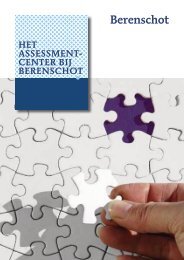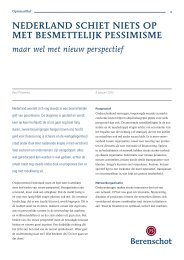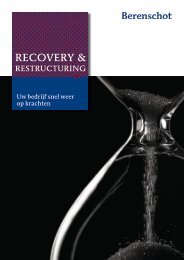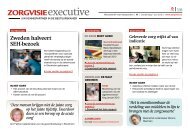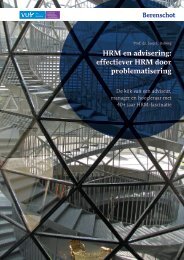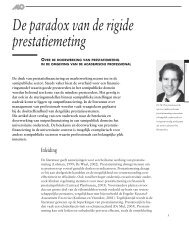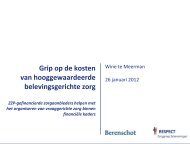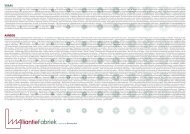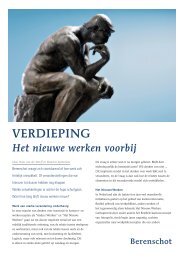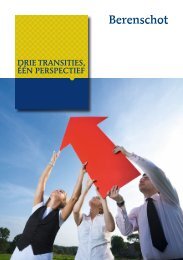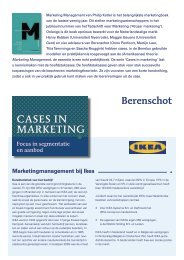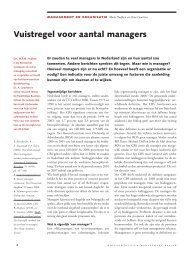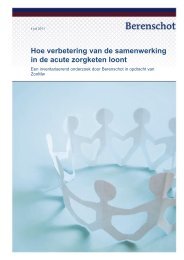ABC van de topsector HTS&M - Berenschot
ABC van de topsector HTS&M - Berenschot
ABC van de topsector HTS&M - Berenschot
You also want an ePaper? Increase the reach of your titles
YUMPU automatically turns print PDFs into web optimized ePapers that Google loves.
of opportunities and<br />
on, Unilever<br />
ment team’.<br />
, Philips<br />
f Netherlands’ Industry and<br />
the plane to Africa’.<br />
inistry of Foreign Affairs<br />
profit organizations<br />
46<br />
ben <strong>van</strong> <strong>de</strong> crises. Hoe internationaler, hoe ongevoeliger<br />
men op dit moment lijkt voor thuismarktfluctuaties. Voor<br />
<strong>de</strong> hand liggen<strong>de</strong> lan<strong>de</strong>n om in te gaan on<strong>de</strong>rnemen, zijn<br />
dan <strong>de</strong> zogenaam<strong>de</strong> BRIC-lan<strong>de</strong>n (Brazilië, Rusland, India<br />
en China). Maar ook het Afrikaanse continent, rijk aan<br />
mineralen en <strong>de</strong> mogelijke toekomstige voedselbank <strong>van</strong> <strong>de</strong><br />
wereld, wordt steeds interessanter voor veel bedrijven.<br />
Voor die bedrijven is er een Engelstalige, praktische handleiding<br />
gemaakt door <strong>Berenschot</strong>, gestoeld op eigen ervaringen<br />
in <strong>de</strong> vele projecten die wij daar uitvoeren.<br />
Marjolein Lem | Rob <strong>van</strong> Tul<strong>de</strong>r | Kim Geleynse<br />
Sub-Saharan Africa offers a challenging, often<br />
turbulent but promising environment for business<br />
expansion. Dutch entrepreneurs have a long<br />
history of operating on the continent, but their<br />
position is now un<strong>de</strong>r pressure. New conten<strong>de</strong>rs<br />
from countries such as China, Brazil and India are<br />
entering African markets with explicit agendas,<br />
extensive resources and a <strong>de</strong>termination to stay.<br />
Un<strong>de</strong>r these changing circumstances, should Dutch<br />
firms follow the Chinese example, ally with the<br />
Americans, nurture a European angle or <strong>de</strong>velop<br />
their own approaches?<br />
This book argues that Dutch entrepreneurs should<br />
do the latter. Innovative approaches, addressing<br />
both risks and responsibilities in a smart mix of<br />
strategies for managing distance, are nee<strong>de</strong>d<br />
to secure a long-term competitive position<br />
in African markets. In this strategic gui<strong>de</strong> for<br />
entrepreneurs, the authors explain the challenges<br />
and opportunities, i<strong>de</strong>ntify the characteristics of<br />
successful business mo<strong>de</strong>ls and provi<strong>de</strong> examples<br />
of leading Dutch firms, both large and small, in the<br />
region. In doing so, they continue where others<br />
left off, showing how to do business and gain a<br />
sustainable competitive ad<strong>van</strong>tage in Africa.<br />
Doing Business in Africa brings together<br />
insights from business practice, aca<strong>de</strong>mia and<br />
policy to provi<strong>de</strong> a broad overview of Dutch<br />
entrepreneurship in Africa. The book is the result of<br />
a collaboration between three partners:<br />
<strong>Berenschot</strong> International, part of management<br />
consultancy firm <strong>Berenschot</strong>, advises<br />
organizations on how to engage in emerging<br />
markets.<br />
The Partnerships Resource Centre (PrC) is part of<br />
RSM Erasmus University Rotterdam, one of<br />
Europe’s leading business schools.<br />
The Netherlands−African Business Council<br />
(N<strong>ABC</strong>) is the leading network organization for<br />
Dutch businesses in Africa, with over 300<br />
members.<br />
Samenwerken<br />
Door het terugtrekken <strong>van</strong> bedrijven op hun kerncompetenties<br />
(Prahalad) en <strong>de</strong> mo<strong>de</strong>rne inzichten over open innovatie<br />
(Chesborough) is het werken in consortia, allianties en<br />
in clusters steeds actueler aan het wor<strong>de</strong>n. Partnerships is<br />
een veel gehoor<strong>de</strong> term. Ook het werken in een campusomgeving<br />
is helemaal <strong>van</strong> <strong>de</strong>ze tijd, getuige <strong>de</strong> vele campusontwikkelingen<br />
in Ne<strong>de</strong>rland, waarbij natuurlijk <strong>de</strong> High Tech<br />
Campus in Eindhoven <strong>de</strong> meest beken<strong>de</strong> en meest gelauwer<strong>de</strong><br />
is.<br />
Vandaag <strong>de</strong> dag blijkt dat <strong>de</strong> ontwikkeling <strong>van</strong> <strong>de</strong> DCN<br />
(Demand Chain Navigator) - in samenwerking met veertig<br />
hightechbedrijven - in 2004 zijn tijd ver vooruit was en dat<br />
er hernieuw<strong>de</strong> belangstelling is voor <strong>de</strong>ze methodiek. Het<br />
mo<strong>de</strong>l neemt <strong>de</strong> markt en <strong>de</strong> relatieve on<strong>de</strong>rlinge positie <strong>van</strong><br />
ketenpartners in die markt als uitgangspunt. Met <strong>de</strong> DCN<br />
wordt een goe<strong>de</strong> samenwerking vormgegeven. Het mo<strong>de</strong>l<br />
maakt ‘direct zichtbare’ prestatie-indicatoren bespreekbaar,<br />
maar ook <strong>de</strong> langetermijnaspecten en <strong>de</strong> overige min<strong>de</strong>r<br />
zichtbare aspecten in een samenwerkingsrelatie.



